Knowledge Hub
Towards a Biocultural Heritage Territory in Rabai Cultural Landscape: Exploring Mijikenda Cultural Values and Practices for Sustainable Development
2021
Author(s): Wekesa C, Ndalilo L, Swiderska K
This case study in Kenya was conducted with the Rabai sub-tribe of the Mijikenda Indigenous community in Kilifi County, coastal Kenya. It was coordinated by the Kenya Forestry Research Institute (KEFRI), working closely with the Rabai community.
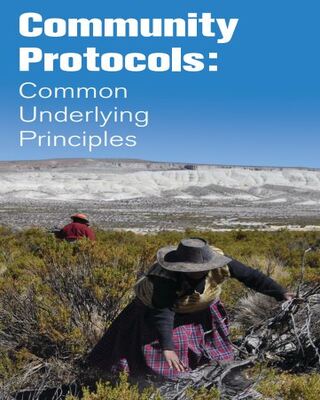
Community Protocols: Common Underlying Principles
2017
Publisher/Organisation: United Nations Environment Programme
Community protocols are an emerging concept in environmental law and policy. The term encompasses abroad range of practices and procedures, both written and unwritten, developed by indigenous peoples and their communities and other local communities (ILCs) in relation to their traditional knowledge (TK), territories, and natural and other resources. These practices and procedures cover a range of matters, including how ILCs expect external actors to engage with them
Supporting Nutrition-Sensitive Agriculture through Neglected and Underutilized Species: Operational Framework
2019
Author(s): Padulosi S, Roy P, Francisco JRM
Agrobiodiversity is a resource that supports human and environmental wellbeing. IFAD’s support for the better use of agrobiodiversity with specific reference to neglected and underutilized species (NUS) and a greater recognition of the traditional knowledge of Indigenous Peoples associated with the use of NUS and wild edibles are important for fighting food and nutrition insecurity, especially in the context of climate change. Both factors have the potential to promote and enhance a sustainable and nutrition-sensitive agriculture (NSA) and associated livelihood outcomes.
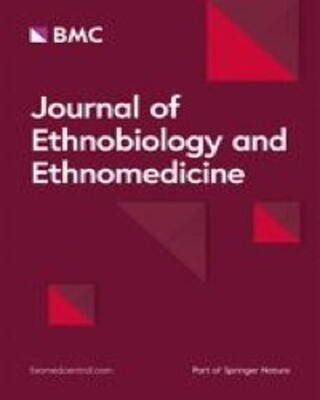
Plants for Making Wooden Bowls and Related Traditional Knowledge in the Gyirong Valley, Tibet, China
2022
Author(s): Ding XY, Guo CA, Hu HB, Wang YH
This study utilized a use-report (UR) to reflect the number of mentions of a species by locals. Between 2019 and 2021, key informant interviews, semi-structured interviews, and participatory observations were used to conduct ethnobotanical field surveys in Gyirong Valley. The field work was performed with the assistance of local guides.
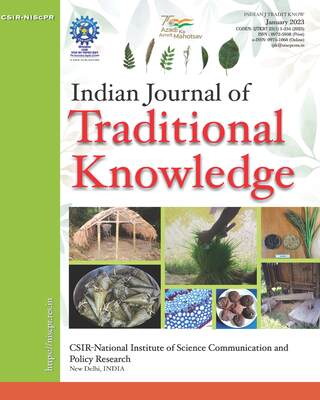
Traditional Meliponiculture by Naga tribes in Nagaland, India
2016
Author(s): Singh AK
In Nagaland, three species (Tetragonula irridipenis, Tetragonula laviceps and Lophotrigona canifrons) of stingless bees were observed; however, most of the beekeepers were rearing T. irridipenis. Stingless bees were found to prefer low light, high humidity, and stenothermal climatic conditions with diverse abundant flora. The traditional colony capture method of terrestrial and subterranean stingless bee was logical and practical and shows immense scope to introduce precise method with scientific interventions.
The Traditional Knowledge Advantage: Indigenous Peoples’ Knowledge in Climate Change Adaptation and Mitigation Strategies
2016
Author(s): Chianese F
The study highlights that indigenous peoples’ knowledge can provide important insights into the processes of observation, adaptation and mitigation of climate change consequences.
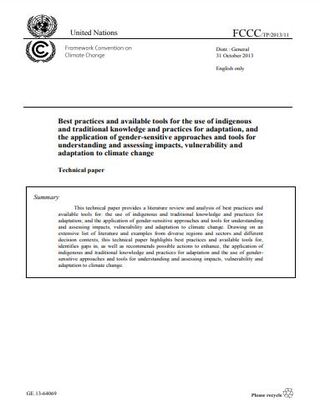
Best Practices and Available Tools for the Use of Indigenous & Traditional Knowledge & Practices for Adaptation & the Application of Gender-Sensitive Approaches & Tools for Understanding & Assessing Impacts, Vulnerability and Adaptation to Climate Change
2013
Author(s): United Nations Framework Convention on Climate Change
Based on an extensive review of relevant information and literature, this technical paper presents a review of best practices and available tools for the use of indigenous and traditional knowledge and practices for adaptation, and the application of gender-sensitive approaches and tools for understanding and assessing impacts, vulnerability and adaptation to climate change.
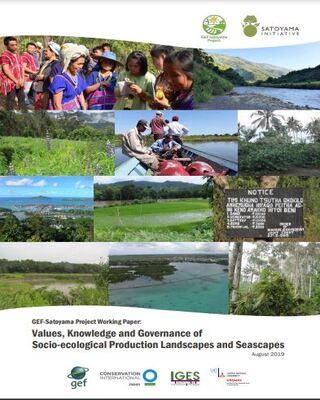
Values, Knowledge and Governance of Socio-Ecological Production Landscapes and Seascapes
2019
Author(s): Takahashi Y, Lopez-Casero F, Natori Y, Dublin D
This publication aims at compiling and disseminating good practices and lessons learnt from the outcomes of the GEF-Satoyama Project, which supported on-the-ground demonstration of sustainable management of socio-ecological production landscapes and seascapes (SEPLS) in ten countries in three biodiversity hotspots.
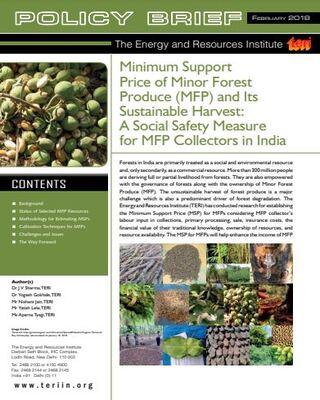
Minimum Support Price of Minor Forest Produce (MFP) and its sustainable harvest: a social safety measure for MFP collectors in India
2018
Author(s): Sharma JV, Yogesh Gokhale Y, Jain N, Lele Y, Tyagi A
The implementation of MSP will help in sustainable forest management, sustaining livelihood of MFP collectors, mitigating climate change, contributing towards Nationally Determined Contributions (NDCs) targets from the forestry sector, and improving the quality of forests.
A People’s Biodiversity Register (PBR) of village Sükhai, Zünheboto, Nagaland
2015
Author(s): The Energy and Resources Institute
The objectives of this study which are in tandem with those specified by the National Biodversity Authority are to develop and maintain an inventory of known biological resources, and to document the traditional knowledge associated with biodiversity in SĂĽkhai.



